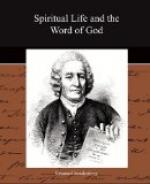It has just been said that at this day it is scarcely known what is meant by charity, and thus by good works, unless it be giving to the poor, enriching the needy, doing good to widows and orphans, and contributing to the building of churches and hospitals and lodging houses; and yet whether such works are done by man and for the sake of reward is not known; for if they are done by man they are not good, and if for the sake of reward they are not meritorious; and such works do not open heaven, and thus are not acknowledged as goods in heaven. In heaven no works are regarded as good except such as are done by the Lord in man, and yet the works that are done by the Lord in man appear in outward form like those done by the man himself and cannot be distinguished even by the man who does them. For the works done by the Lord in man are done by man as if by himself; and unless they are done as if by himself they do not conjoin man to the Lord, thus they do not reform him. (A.E., n. 933.)
But for works to be done by the Lord, and not by man, two things are necessary: first, there must be an acknowledgment of the Lord’s Divine, also that He is the God of heaven and earth even in respect to the Human, also that every good that is good is from Him; and secondly, it is necessary that man live according to the commandments of the Decalogue, by abstaining from those evils that are there forbidden, that is, from worshipping other gods, from profaning the name of God, from thefts, from adulteries, from murders, from false witness, from coveting the possessions and property of others. These two things are requisite that the works done by man may be good. The reason is that every good comes from the Lord alone, and the Lord cannot enter into man and lead him so long as these evils are not set aside as sins; for they are infernal, and in fact are hell with man, and unless hell is set aside the Lord cannot enter and open heaven. This is what is meant by the Lord’s words to the rich man:
Who asked Him about eternal life, and said that he had kept the commandments of the Decalogue from his youth; whom the Lord is said to have loved, and to have taught that one thing was lacking to him, that he should sell all that he had and take up the cross (Matt. xix. 16-22; Mark x. 17-22; Luke xviii. 18-23).
“To sell all that he had” signifies that he should relinquish the things of his religion, which were traditions, for he was a Jew, and also should relinquish the things that were his own, which were loving self and the world more than God, and thus leading himself; and “to follow the Lord” signifies to acknowledge Him only and to be led by Him; therefore the Lord also said, “Why callest thou Me good? There is none good but God only.” “To take up his cross” signifies to fight against evils and falsities, which are from what is one’s own (proprium). (A.E., n. 934.)
III. Shunning Evils
In the previous chapter two things are said to be necessary that works may be good, namely, that the Divine of the Lord be acknowledged, and that the evils forbidden in the Decalogue be shunned as sins. The evils enumerated in the Decalogue include all the evils that can ever exist; therefore the Decalogue is called the ten commandments, because “ten” signifies all.




